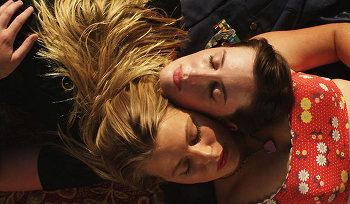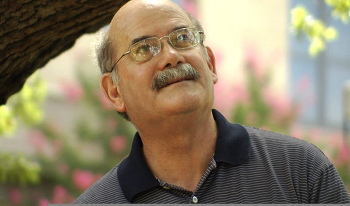

By Kim Voynar Voynar@moviecitynews.com
SIFF 2012 Dispatch: Review Roundup
Here’s one last roundup of some more films from this year’s SIFF that I’m finally getting around to writing up …
Charming, lightly funny tale of Jenn (Jenn Harris), a single, 30-something hot yoga instructor who decides she wants to grow up and have a baby, and Matt (Matthew Wilkas), her gay BFF who agrees to father her child. In the wrong hands, this material would be completely one-dimensional and contrived, but writer-director Jonathan Lisecki (expanding off his 2010 short of the same title) manages to pull off a likable film in spite of it often feeling like an extended sitcom pilot. That’s not in and of itself a bad thing, by the way … if they’d sharpen the dialogue a bit and keep delving into all the potentially challenging issues of these characters having and raising a child, they could have a funny television series out of this.
 Ira Finkelstein’s Christmas
Ira Finkelstein’s Christmas
A story about a young Jewish boy who’s obsessed with the one thing he’s never had: Christmas. Ira Finkelstein has his heart set on a white Christmas but gets sent to his grandparents in Florida, who haven’t seen him in years, instead. When Ira meets another unaccompanied minor, Mikey, at the airport, and finds out Mikey is en route to Christmastown, Washington, to visit relatives for the holidays, he persuades his new friend to trade places with him. Fun ensues as the consequences of the seemingly harmless swap snowball out of control.
Director Sue Corcoran has great fun playing around with her material, and shows a knack for getting the most out of both seasoned performers (Elliot Gould, David Delouise) and newcomers (Elijah Nelson as Ira, Justin Howell as Mikey, Shaye Hodgins as Mikey’s sweet, optimistic cousin Clare). Everyone involved seems to have a terrific time turning Leavenworth, Washington into the tale’s fabled Christmastown. The script plays with the usual holiday tropes, and it’s more than a little heavy on the Jewish stereotypes, but I could certainly see Ira Finkelstein playing on television every year alongside other holiday fare. Corcoran and her producers mentioned in the Q&A that they’re aiming to sell to television for seasonal viewing, so perhaps we’ll see that happen.
 Keyhole
Keyhole
One of Guy Maddin’s weirder movies (and that’s saying a lot), this twisted tale of gangsters and ghosts is never quite shoot-’em-up gangster movie, never quite a horror tale about a haunted house, but somehow interweaves elements of both in a complicated puzzle that leans heavily on Homer’s Odyssey for inspiration. Like all of Maddin’s films, though, it’s the psychological underpinnings that are most important here; the house isn’t haunted by ghosts so much as it is by the lifetime of regrets that Ulysses Pick (Jason Patric, in a solid turn) carries in his soul. Gorgeously shot (digitally, unusual for Maddin) in shades of misty silver by Seattle-based rockstar DP Ben Kasulke, who also shot my favorite Maddin film, Brand Upon the Brain!, Keyhole isn’t what I’d call Maddin’s most accessible film, but like all of Maddin’s work, it’s an opportunity to examine the world from his tortured, anguished perspective; and like all of Maddin’s films, it’s likely to stick with you long after you see it.
 Liberal Arts
Liberal Arts
Triple-threat Josh Radnor (How I Met Your Mother) dives into somewhat more mainstream waters than with his previous feature, Happythankyoumoreplease, this time telling a story about Jesse, a 35-year-old man-boy who seeks refuge from mundane life in books and still waxes nostalgic for his salad days as a student at a prestigious liberal arts college. When Jesse goes back to his alma mater for a retirement bash for his favorite professor (Richard Jenkins), a budding friendship and mutual attraction with Zibby (Elizabeth Olsen) a brainy, fresh-faced 19-year-old undergrad, serves as a catalyst for him to question the direction (or lack thereof) his life has taken since college.
This is slightly longer than the capsule review I’m technically allowed, but if we subtract the part that’s synopsizing the plot for you, on the balance I think we’re still okay here, so I’ll add this: The more I see of Radnor, the more I like him. He Skyped in for a post-screening Q&A at SIFF, and he came across as smart, engaging, and seeking constantly to self-critique and improve as a writer-director. Liberal Arts isn’t a perfect film – it really would have benefited from someone having a little more at stake here, or from pushing a little farther with Jenkins’ tragically bereft recent retiree and there’s a side story involving a depressed student Jesse befriends that plays out a bit too predictably. But overall this is an enjoyable story, with abundant lovely shots that evoke Radnor’s fond memories of his own liberal arts alma mater, Kenyon College, where the film was shot. Zac Efron has a delightfully funny, surprisingly spot-on turn in a minor role as a spacey would-be philosopher, and actually avoids breaking into song and dance numbers for the duration.
 Moonrise Kingdom
Moonrise Kingdom
I finally caught up with Wes Anderson’s delicious confection of a coming-of-age tale, Moonrise Kingdom, and found myself completely enamored of this tale about Suzy (Kara Hayward) and Sam (Jared Gilman), a pair of misfit preteens who fall in love and, with all the logic of a Wes Anderson movie, run away with each other on their small, remote island, causing everyone else to convene in a search party to find them. Bob Balaban (with perfect deadpan delivery through a beard that appears to have been dusted off and reused from The Life Aquatic) serves as narrator of the strange little tale, and along for the ride we have Frances McDormand and Bill Murray as Suzy’s lawyer parents, who seem only to be able to communicate with each other in legalese; Edward Norton, practically perfect as Scout Master Ward, the head of the Khaki Scouts troop from which young Sam runs away; Tilda Swinton as the stern-faced, starchly uniformed “Social Services,” who comes to haul the orphaned, recalcitrant Sam off for electroshock and other such delightful bureaucratic therapies; and Anderson standby Jason Schwartzman in a delightful cameo as Cousin Ben, the scheming head of Supplies and Resources for a neighboring Scout encampment, who helps facilitate Sam and Suzy’s improbably, romanticized escape.
Underneath the trademark deadpan line delivery and the too-wise adolescents familiar to both fans and detractors of Anderson’s work is this heartfelt, sweet story about young love that captures perfectly just how it feels to be a young person in love for the first time, with the first person we find that truly “gets” who we are – and the lengths we imagined at that age we would go to in order to preserve and cling to that love. Yes, the characters are somewhat broadly sketched, but its those broad strokes that make them universally appealing and relatable. We’ve all of us, at some point in our lives, probably felt isolated from our family like Suzy, or alone in the world and searching for adventure like Sam, or desperately in need of structure and order like Scout Master Ward, or desperately in need of human connection and contact like Suzy’s mother, who skirts around the edges of an affair with Captain Sharp (Bruce Willis, pitch-perfect), the kind-hearted cop who searches for the runaway young lovers.
You really have to not like Wes Anderson at all, I think, to not fall in love with Moonrise Kingdom. This is perhaps the most “Wes Anderson” of all of Wes Anderson’s movies, shot with vividly saturated gorgeousness, shot after perfectly composed shot of painterly beauty that’s almost overwhelming in its overall effect. Words like “lovely” and “gorgeous” don’t seem nearly big enough or specific enough to encompass just what a marvel Moonrise Kingdom is. I wanted to see it again, and again, and yet again, before the closing credits even started rolling. Simply sublime.
 The Most Fun I’ve Ever Had with My Pants On
The Most Fun I’ve Ever Had with My Pants On
Speaking of beautifully shot films, I was quite taken by the way in which Drew Denny’s semi-autobiographical road-trip tale The Most Fun I’ve Ever Had With My Pants On was shot by Will Basanta (who also shot the equally lovely Jess + Moss); there are moments when the perfectly composed, saturated shots made me catch my breath, and I wanted to hit “pause” to just soak it in.
Jess + Moss premiered at Sundance and played at SIFF last year, and Basanta and director Clay Jeter talked then about shooting that film on remnants of expired film stock and not being sure exactly what they’d get out of it. In a sense that film’s cinematography was an exercise in boldly exploring the kinds of looks that could be achieved out of expired stock and working with what you got. The careful stitching together of many frames of loveliness to tell a story of childhood and memory with the dreamy Jess + Moss was accomplished as much through Issac Hagy’s spot-on editing as it was through the visuals, but it was Basanta who gave Hagy all that beauty to work with. I wondered then if the beauty of Jess + Moss had been as much the result of fortuitous happenstance as it was artistic choice. Here though, Basanta shoots with an assured eye and deliberation that asserts he’s a cinematographer you want to keep an eye on. He has a natural gift for capturing the beauty of the world in a magical way, using his camera to paint a canvas of composed and saturated colors as if he’s seeing everything around him with eyes of wonder. He works with nature the way a painter might work with oils on a canvas.
The Most Fun I’ve Ever Had With My Pants On reunites many of the pieces that made that film work so well: In addition to Basanta as cinematographer, we have J + M director Clay Jeter on board as producer, Sarah Hagy (Jess from J + M) as Liv, best friend to Denny’s quietly grieving Andy, and Hagy once again taking on the editing. In many ways this is a typical indie road trip/buddy tale with a couple of quirky chicks instead of a couple of quirky guys, but the unexpected honesty with which Denny boldly interweaves moments of stark personal reflection and detail into this otherwise simple tale about two friends taking a road trip across the southwest to scatter a dead father’s ashes, and what they learn about themselves and each other along the way, makes it ring true where other indie films along a similar vein have felt contrived or simply stilted. Mark Denny as one to watch too — I’ll be curious to see what this engaging young artist/writer/director/musician does next.
 The Revisionaries
The Revisionaries
A few years ago, Rachel Grady and Heidi Ewing made what’s perhaps their best-known film, Jesus Camp, a remarkably objective examination of right-wing fundamentalists indoctrinating children to be little “soldiers for Christ,” a film that a fellow critic described at the time (and rightfully so) as the scariest movie he’d seen that year. With The Revisionaries, Scott Thurman, flying solo for the first time as director on a doc feature, brings a similarly balanced eye to this documentary about the importance of the Texas Board of Education in determining the content of textbooks across the nation, and how Don McLeroy, a little-known Christian dentist got himself elected chair of the BOE and subsequently did all that the could to weaken the teaching of evolution in science textbooks in Texas.
If you heard about all that nonsense back when it was happening and thought to yourself, “Boy, I’m sure glad my kids don’t go to school in Texas,” this film will make you think again about the impact seemingly ridiculous happenings in the Lone Star state could actually have on your own kids’ education.
Part of what makes The Revisionaries so effective is McLeroy himself, who’s so jolly and earnest it’s hard to perceive him as potentially dangerous to the science education of children not just in Texas, but across the country. Far-right conservatives might take issue with the way in which they’re represented here by McLeroy and his fellow conservative Christian BOE members, who seem to have great difficulty grasping the concept of separation of Church and State, but Thurman’s just holding up a mirror to what’s actually there and showing it in the context of how these people’s religious beliefs actually impact the decisions of the nation’s major textbook manufacturers with regard to content that ends up being taught in our public schools.
I’d honestly never given any thought to how the ridiculousness in Texas over evolution and creationism could impact my own kids here in liberal Seattle, until Thurman pieced together here the way in which the textbook standards of a state like Texas — a huge source of revenue and therefore very influential in what ends up in books sold to other states — can affect students everywhere. Thurman makes his case effectively here, mostly by letting the real players just open their mouths and speak for themselves. But I’d be willing to bet, just as Jesus Camp played equally well to both sides, that if you showed this film to an audience full of Texas fundamentalist creationists, they’d walk out feeling like the film portrays a victory for Christ in keeping science at bay in textbook standards, and in advancing the cause of creationism and “intelligent design.”
Compelling, essential viewing whether you’re already interested in the politics of religion, or think such things don’t apply to you because you don’t live in Texas. Watch The Revisionaries, then think again.
















I had the pleasure of watching The Most Fun I’ve Ever Had With My Pants On at SIFF and i agree completely with you. What a beautiful film. This will do great things. Dir. Drew Denny is definitely someone to watch out for.
Moonrise Kingdom was amazing as well. No brainier.